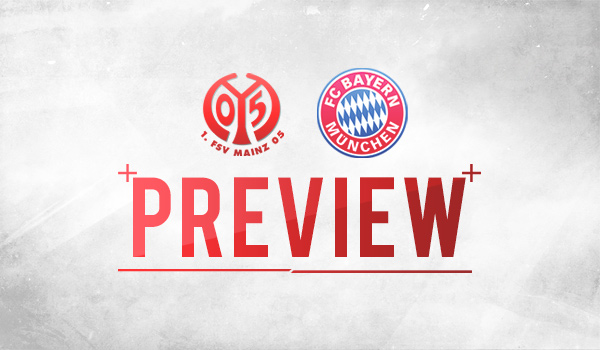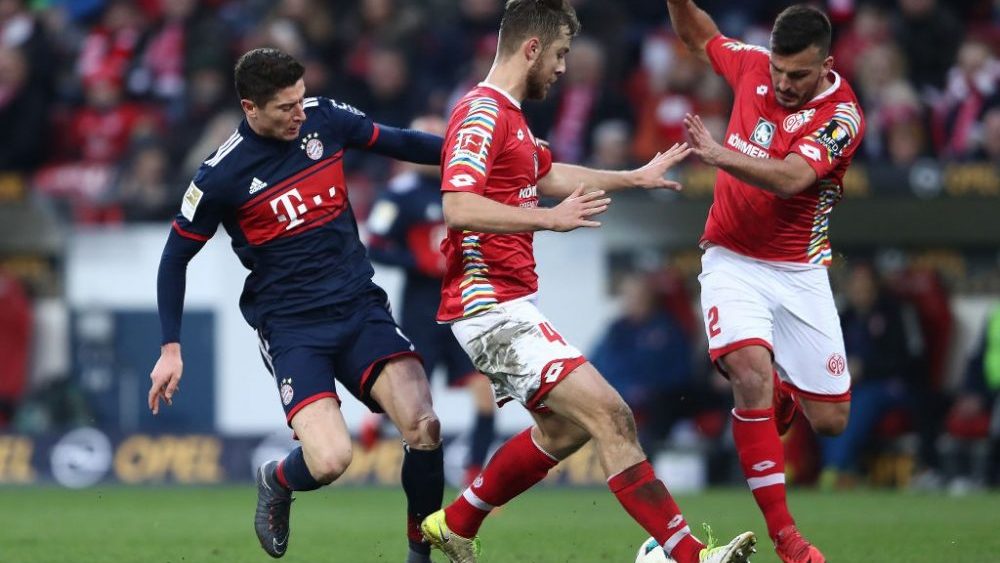Preview: FSV Mainz 05 – FC Bayern München
When the coach is satisfied in his public image, that should actually be a good sign. Kovač praised his players, and saw the performance in Athens as progress.
It was, in fact. At no time in the game did AEK Athens have a chance for more than a point. Defensively, Bayern were secure and in many phases of the game they seemed more concentrated than they were before the international break. It’s completely clear, though, that that can’t be the extent of the requirements.
It seems to be all the more irritating for some observers that Kovač talks of one or two things that need improving. The path from the performance at the moment to a top team is still quite long. And the coaching staff has a part to play in that.

Offset uncertainties in the system
It’s laborious to constantly evoke the good old times under Guardiola. From time to time it’s even annoying. The team has changed, key players are even further beyond their zenith than three years ago, and the younger generation still needs time to emerge from the shadow of the older one.
That’s why the general criticism of the squad politics is also justified in many points. Too little is going on down the wings at the moment. Bayern would like to play the system that they’ve been playing for almost a decade. That system simply isn’t perfect any more – at least not in the necessary dominance. As a result, uncertainties arise. Even with superstars who have been through everything in their careers.
It’s the strength of a world class coach to offset those uncertainties. With a system that gives a team confidence if it’s no longer superior individually due to several factors. But Bayern just keep doing their thing. If it’s not going right, then it’s time for dribbles and crosses. At some point the quality of a Robben, Ribéry or Lewandowski will show through. In the meantime, however, that happens clearly less often than you might suppose.
Game between requirements and expectations
And so above all ideas are needed. Ideas to resolve dependence on the wide players. Ideas to provide more presence in the centre and allow the team to then become successful with combinations instead of one-against-ones. Ideas to develop a structure on the pitch that gives confidence to the collective. What is needed, then, is a coaching team that can mask the weaknesses of an ageing squad with strategic adjustments.
Overload here, swift play there and then see what Robben and Ribéry can conjure up with the ball together. Not that that was simple at the time. Ultimately the entire positional play was based on those key players. But now the one-time needle players are just blunt toothpicks. The question as to whether Niko Kovač and his team can change the system so that that is no longer of consequence has been in a vacuum since the start of the season. There’s still no answer to it. But there are tendencies. And there’s the typical game between expectations and requirements.
FC Bayern’s requirements are to always have top quality in all areas. The reality, and as a result the expectations, however, are different. It’s not just football that has cycles. After a successful phase, another successful phase rarely follows right after. Big teams need time. They need to grow and develop. Perhaps at the moment that’s just a normal process then. Or it’s the belated recognition of the necessity of that process.
Where’s the development?
Niko Kovač has also earned time as a result. To expect him to solve all problems in one fell swoop, problems with which huge coaches like Carlo Ancelotti or Jupp Heynckes likewise didn’t cope with at the highest level, is perhaps asking too much. Because when looking back it’s often forgotten that Heynckes also had huge problems with this team. Maybe that means that this team just won’t ever reach that rather high level again. That it’s over and this season can only serve as the basis for the future – positively or negatively.
Maybe that also means, though, that Kovač himself is still in a learning phase and could strike it rich on the search for structure. That he’ll find the system that gives this now unconfident, ageing team a framework with which it can be successful again. Because Neuer, Müller, Boateng, Hummels, Martínez, and Lewandowski aren’t that old either.
In the last few games it didn’t exactly look like there was a development towards a better basic structure. At most, details or the personal occupation of positions were changed. The actual problems in the build-up and in the occupation of the spaces between the lines weren’t resolved by that, but were made worse if anything. A criticism that the training staff, despite the squad problems, will have to take.
Mainz’s defensive bolt
Against Mainz 05 there certainly has to be a clear improvement. That may be a sentence that has appeared here several times already in some variations, but now it’s about time. Mainz may be lacking in penetration up front, but at the back they constitute one of the best defensive lines in the league at the moment. Only eight goals conceded so far for FSV – four of those on the last matchday against Gladbach.
At home, Sandro Schwarz’s team is also still unbeaten. In differing variations of a four-man defence, Mainz shifted very compactly and industriously in many games. With the right mixture of aggression and tactical discipline, they were able to concede very few clear-cut chances. Up until the Gladbach game, Mainz had 8.2 xG against them – the league’s third best.
They do concede on average 14.8 shots per game, but the xG value shows that these shots often have little quality. On average, however, Mainz have so far have 49.2% possession. That’s a number they can’t expect to repeat against FC Bayern.
The biggest challenge since Van Gaal
Consequently the match will be an important yardstick for both teams. Mainz can prove that in long phases out of possession they also have the mental strength to keep the opposition away from the danger zone. For Niko Kovač and FC Bayern, meanwhile, it’s about having a well formed and compact defence with a clear concept. And ‘clear concept’ is not to be understood as ‘giving Kimmich the ball and letting him cross until someone scores’.
Being pleased about a positive trend of results goes without saying and nobody should be prohibited from doing so. However, that joy won’t last long if FC Bayern’s problems, which go beyond one or two things, aren’t resolved soon. Because as much as one might want the coaching team to get a bit of team, you know equally well that this club won’t allow any failure.
It’s even more deplorable from the perspective of a coach when you’re the one who has to modify a long-successful as hardly anyone has done before. Preferably in record time. It’s the biggest challenge since Van Gaal. And even he needed some luck to set in motion what FC Bayern profited from until today.









